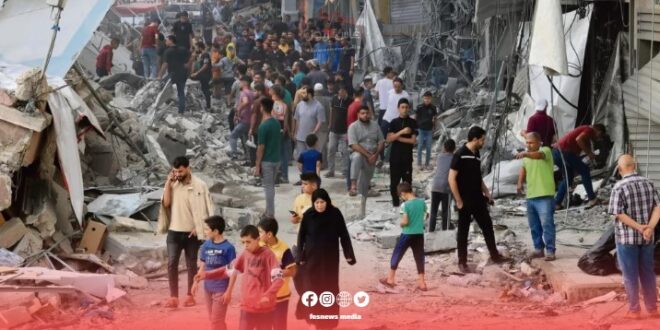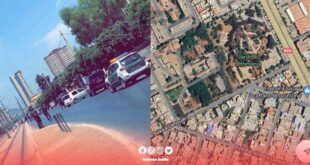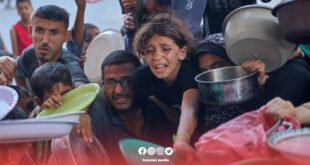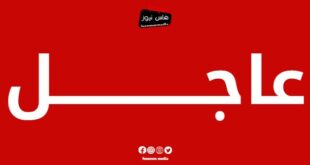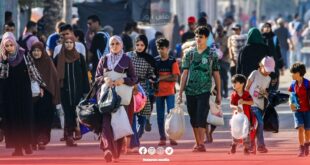A meeting in Cairo on a proposed truce linked to the release of hostages in the Gaza Strip concluded on Sunday without tangible progress, while Israel and Hamas remain inflexible after seven months of war.
Israeli Prime Minister Benjamin Netanyahu reiterated that Israel “will not surrender” to Hamas and cannot “accept” the demands of the Islamic movement, which call for a permanent ceasefire in the Palestinian territories as a basic condition for any agreement, especially with regard to the release of prisoners, hostages who were kidnapped on October 7 in Israel.
For his part, Benjamin Netanyahu is still threatening to launch an attack on the densely populated city of Rafah, on the southern end of the Gaza Strip.
The Prime Minister also announced his government’s decision to close Al Jazeera’s office in Israel and its headquarters in Qatar. The channel, which devoted much space to covering the war in Gaza, stopped broadcasting in Israel in the afternoon.
Al Jazeera denounced the “criminal” decision, and Hamas denounced the “flagrant violation of press freedom” aimed at “concealing the truth” about the war.
Hamas leader, Ismail Haniyeh, who resides in Qatar, had previously accused Netanyahu of “sabotaging the mediators’ efforts” with the aim of reaching a truce, while the discussions that began the previous day in Cairo continued between a delegation from the movement and Qatari and Egyptian representatives.
At the end of the day, a Hamas official announced that this meeting had ended and that the delegation would head to Doha to consult with its political leadership.
The offer submitted by the mediating countries, Qatar, Egypt and the United States, to Hamas at the end of April stipulates a truce linked to the release of hostages held in the Gaza Strip, in exchange for Palestinian prisoners held by Israel.
American media reported that CIA Director William Burns was in Cairo on Sunday, while Israel was not present in the discussions.
A Hamas official said earlier Sunday that the movement “will under no circumstances accept an agreement that does not explicitly provide for an end to the war.”
Netanyahu announced in the Cabinet: “When Israel shows its good faith, Hamas continues its extremist positions, most notably its demand for the withdrawal of our forces from the Gaza Strip, an end to the war, and the preservation of Hamas… Israel cannot accept this.”
He added that “surrendering” to Hamas’ demands would be a “terrible defeat” for Israel.
The war broke out on October 7 when Hamas commandos, infiltrating from Gaza, launched an unprecedented attack in southern Israel, killing more than 1,170 people, most of them civilians, according to an Agence France-Presse report based on official Israeli data.
During the attack, more than 250 people were kidnapped and 128 of them are still being held in Gaza, including 35 killed, according to the army.
On Sunday, the Hostage Families Forum called on Netanyahu to “ignore political pressure” and accept a deal that would allow the hostages to be released.
This text read: “Mr. Netanyahu, history will not forgive you if you waste this opportunity.”
The Israeli attack launched by the Israeli army on the Gaza Strip in response to the October 7 attack has killed 34,683 people so far, according to the Hamas Ministry of Health, which on Sunday counted 29 dead within 24 hours.
Gaza City in the north was bombed, as well as the center and south of the Strip, including the city of Rafah and the neighboring town of Khan Yunis.
Israel has pledged to eliminate the Islamic movement that has held power in Gaza since 2007, and which it considers, along with the United States and the European Union, a terrorist organization.
In order to achieve “final victory” and liberate the hostages, Benjamin Netanyahu continues to announce that he will launch a ground attack on Rafah, where, according to Israel, four Hamas battalions are gathered.
This city, the only urban center in the region that Israeli soldiers have not yet entered, has become the last refuge for hundreds of thousands of civilians who fled the war north. According to the World Health Organization, there are still 1.2 million Palestinians huddled there.
The United States, Israel’s main ally, opposes launching a large-scale attack on this city, as is the case with many capitals and humanitarian organizations that fear heavy civilian casualties.
US Secretary of State Anthony Blinken warned that the damage that the attack on Rafah might cause “will exceed what is acceptable.”
Rafah is located on the closed border with Egypt, and is also the main land crossing point for humanitarian aid into the Gaza Strip, which is blockaded by Israel. The United Nations warned that the attack would be a “severe blow” to humanitarian operations.
The Director of the United Nations World Food Program, Cindy McCain, expressed her alarm at seeing the northern Gaza Strip suffering from “real famine”, advancing towards the south.
Humanitarian aid, which is strictly controlled by Israel, remains woefully insufficient to meet the needs of Gaza’s 2.4 million people.
The Israeli army announced on Sunday that it had closed the Kerem Shalom crossing, which had been subjected to missile strikes.
On the northern front of Israel, on the border with Lebanon, Lebanese Hezbollah announced that it had fired “dozens of rockets” towards Israeli territory after killing “four civilians from one family, according to the official Lebanese agency, in an Israeli raid,” in southern Lebanon.
From: Fez News website
 فاس نيوز ميديا جريدة الكترونية جهوية تعنى بشؤون و أخبار جهة فاس مكناس – متجددة على مدار الساعة
فاس نيوز ميديا جريدة الكترونية جهوية تعنى بشؤون و أخبار جهة فاس مكناس – متجددة على مدار الساعة

